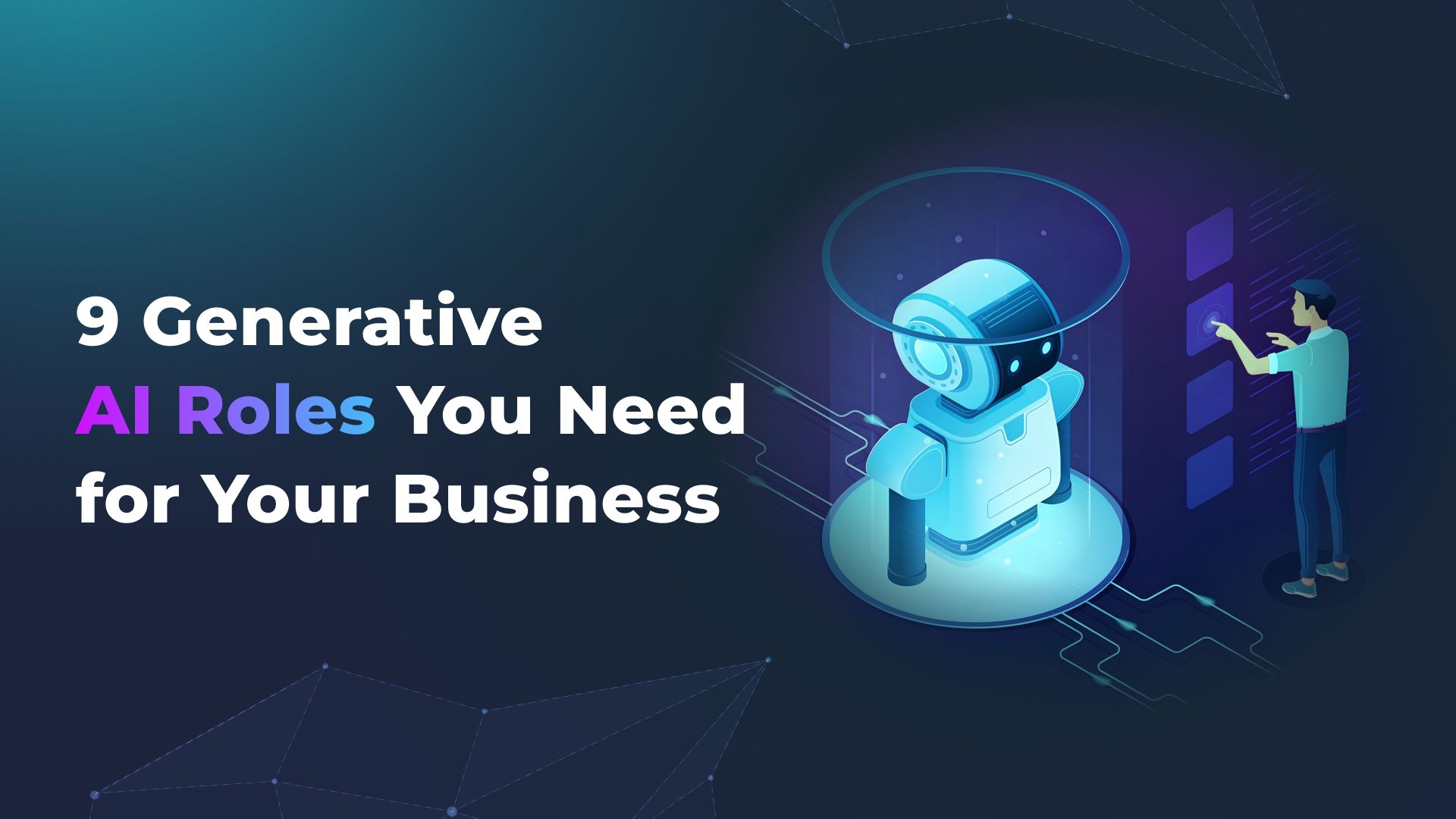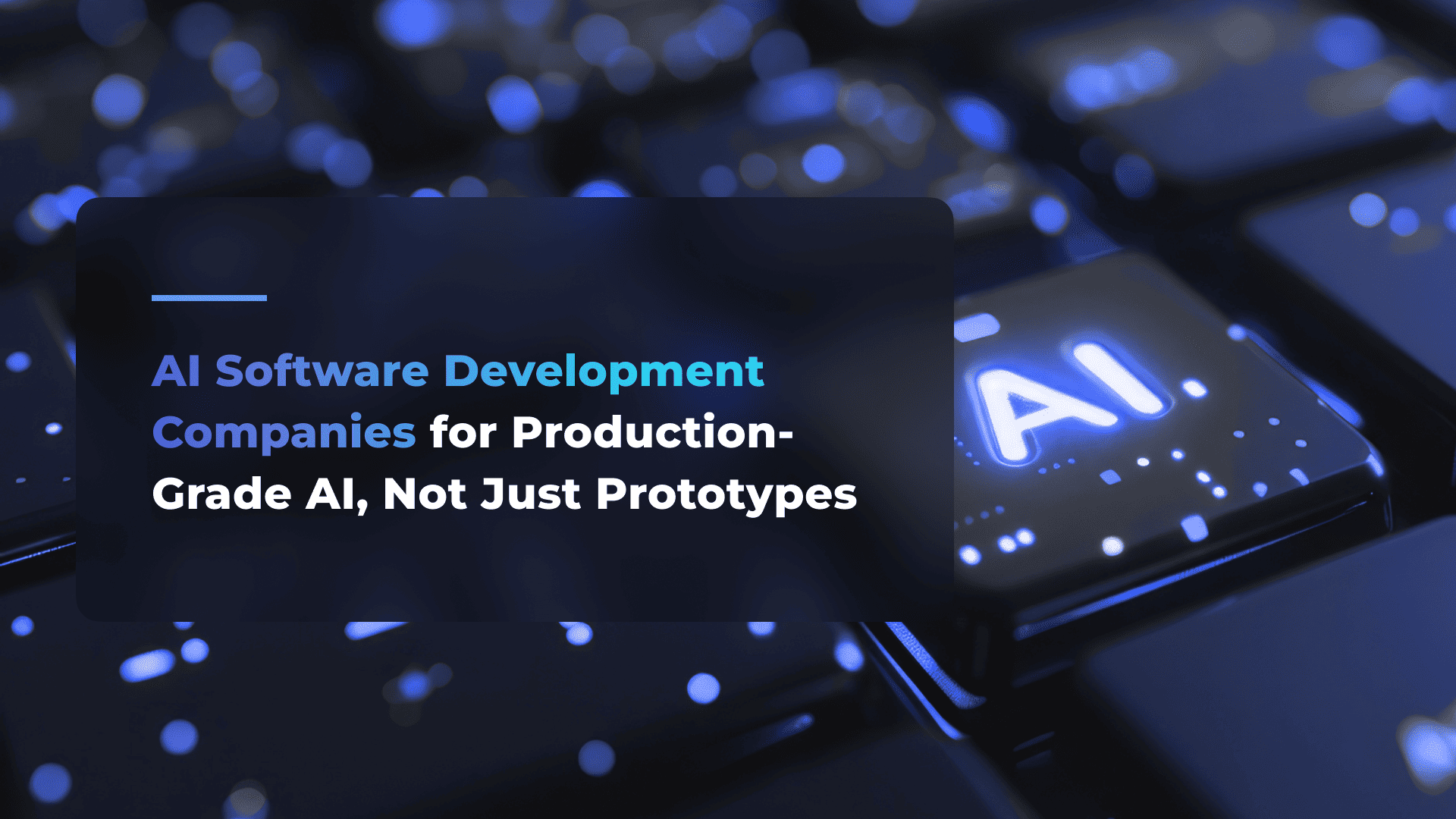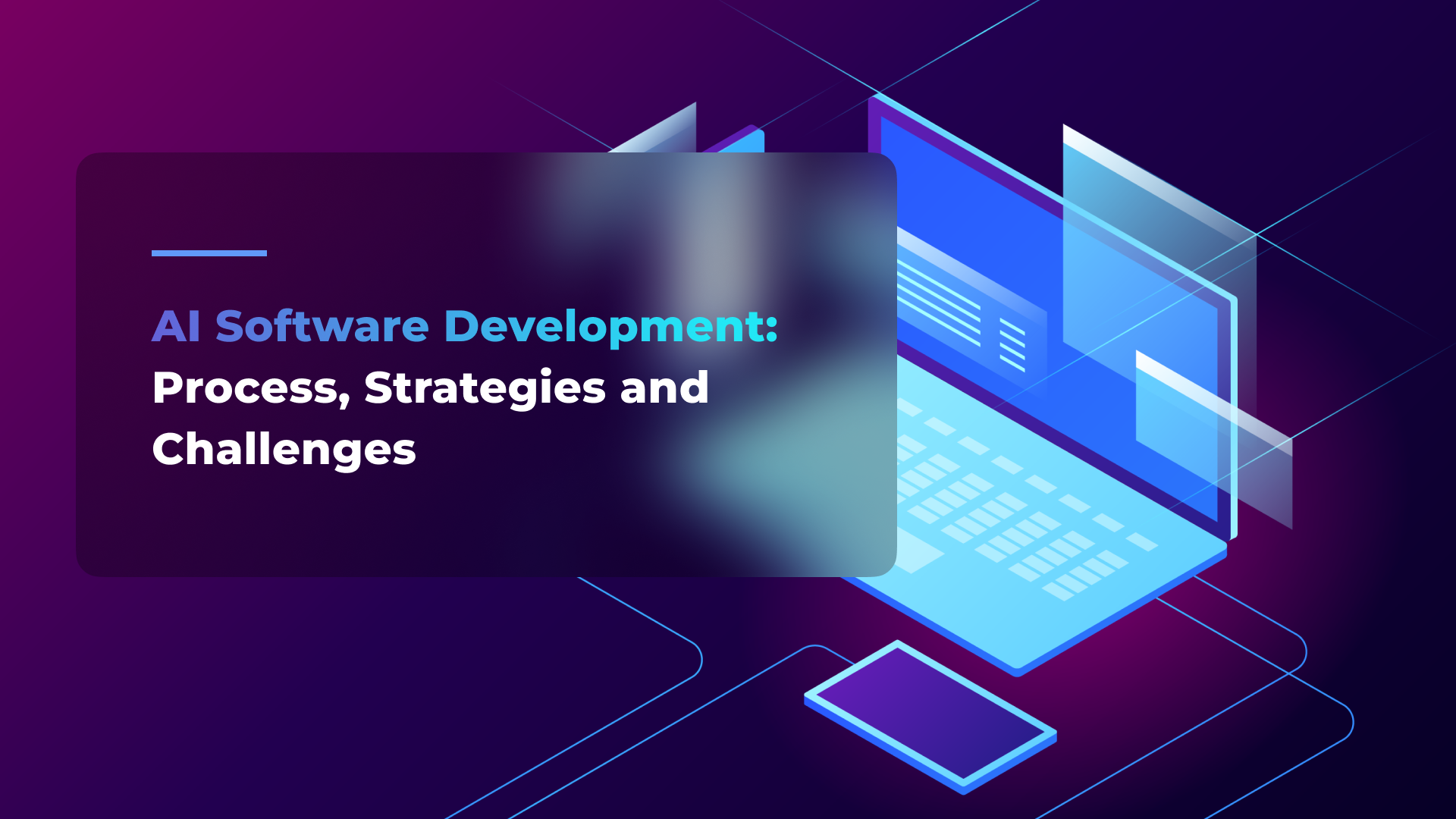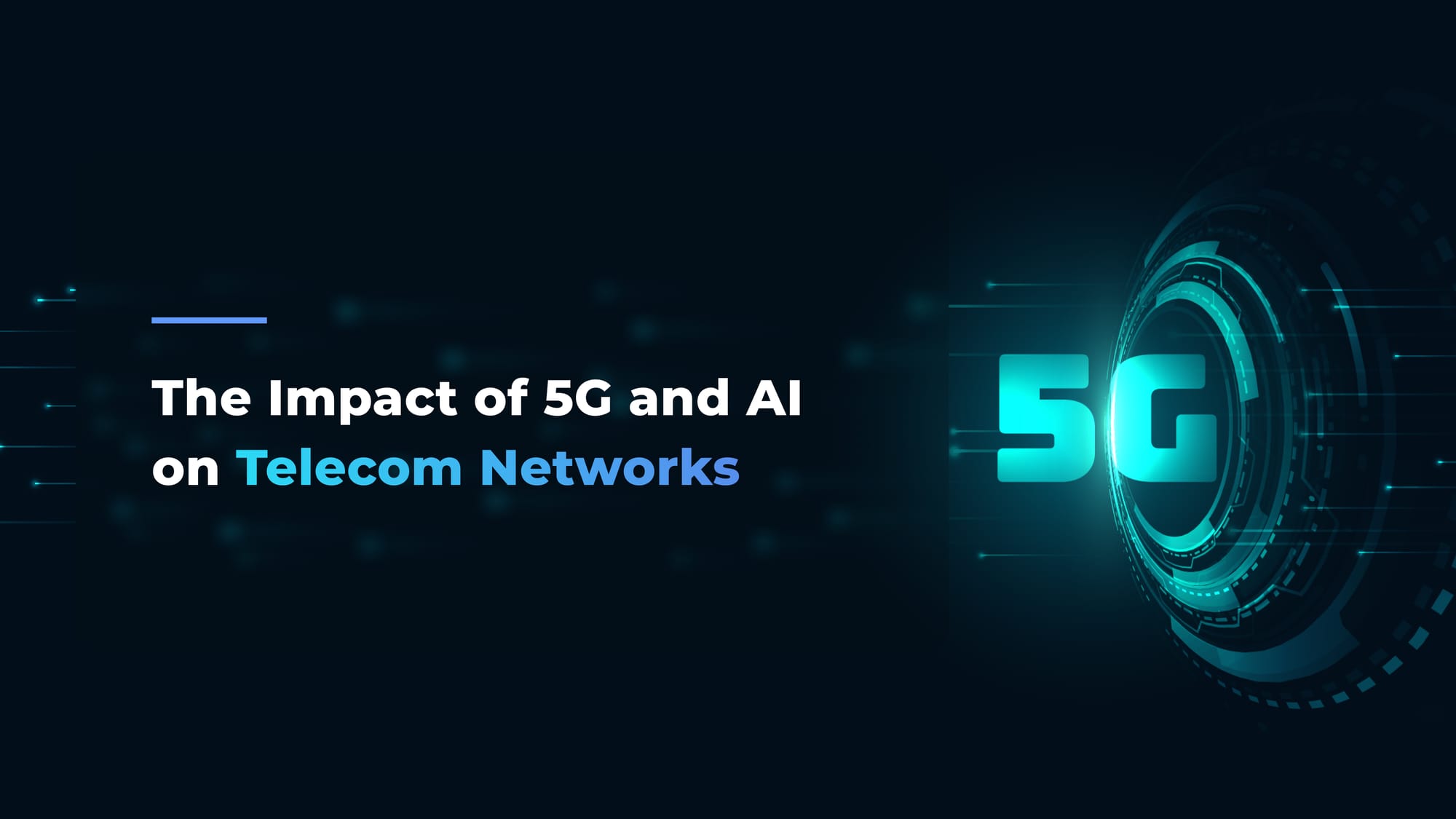9 Generative AI Roles You Need for Your Business

Generative AI is booming, so the demand for tech talent with experience in this technology is huge. According to Upwork, only in the second quarter of 2023 the number of gen AI job posts grew by more than 1000%. Searches for gen AI-related jobs also jumped (by more than 1500%) around the same time.
Being a new technology that evolves almost daily, business owners still have to figure out what gen AI is and what talent they need to hire. What’s more, many job titles and responsibilities are still being defined, so companies are trying to understand which skills are essential and how these roles fit into their overall gen AI strategy.
As an AI-focused team, we at Flyaps have 11+ years of experience helping businesses in various domains adopt different types of AI. Being familiar with the technical complexities, AI development platforms and practical applications of gen AI, we would like to talk more about specialists who apply this technology and what skills they must have.
Let’s start with one of the most confusing roles for many non-technical people – a data scientist.
Data scientist
At first glance, data science and gen AI look pretty similar as both heavily rely on data. However, data science is using statistical tools and methods, as well as AI tools , to gain insights for business. For example, retailers can hire data scientists to help them identify the buying patterns of different customers and divide them into interest groups, resulting in more targeted advertisements and personalized shopping experiences. On the other hand, all types of AI, including generative AI, can use the data processed by data scientists to tackle tasks that normally require human intelligence.
When they’re part of a generative AI team, data scientists build predictive models for solving specific business problems, implement analytical models with other members of the gen AI team, and help transition from traditional software to AI-driven software.
| Skills a data scientist needs |
|
Machine learning engineer
Machine learning engineers turn business needs into machine learning projects and lead the design and implementation of these solutions. They train, deploy, and improve scalable machine learning models.
Imagine a company that wants to predict customer churn or the likelihood of customers leaving their service. The machine learning engineer’s job in this case would be to design and implement a solution for this. They start by understanding the business problem and identifying the data needed. Then, they create/choose and train a machine learning model using this data, teaching the model to recognize patterns that indicate a customer might leave.
Once the model is trained, machine learning engineers deploy it into the company's systems so it can make real-time predictions. They also continuously monitor and improve the model, ensuring it remains accurate as new data comes in.
| Skills a machine learning engineer needs |
|
AI can do more for your business—let’s find the best way to make it work for you. Check out our expertise and let’s discuss your next AI project.
See our AI servicesNLP engineer
NLP engineers use machine learning and linguistics to design and develop algorithms and models so the overall gen AI solution understands and generates human and programming languages. Suppose, an NLP engineer working on a voice assistant. Their job is to ensure the assistant can understand spoken commands and respond accurately.
They start by analyzing how people speak, including different accents and slang. Using this data, NLP engineers design algorithms that can recognize and interpret these variations. Next, they train these algorithms with lots of examples of spoken language, teaching the AI to understand and respond correctly.
After the algorithms are designed, the engineer tests them, making adjustments to improve accuracy. This way, when you ask the voice assistant to, for example, "play my favorite playlist," it understands your request and plays the correct songs.
In essence, NLP engineers make sure that AI systems can communicate effectively with people, understanding and responding to natural language in a way that feels smooth and intuitive.
| Skills an NLP engineer needs |
|
Prompt engineer
Prompt engineering is the process of training LLMs or any other AI models to give as accurate outputs as possible. It works like this: prompt engineers create an input (prompt) that guides the AI to give the desired response. The prompt can be specific questions, commands, or statements that the AI can interpret to generate useful and relevant output. Then, the specialist evaluates the output, gives the system feedback, and redefines the prompt. After several rounds, the system will give a desirable result. The output can be in any form, depending on the model - text, image, video, audio.
| Skills a prompt engineer needs |
|
Algorithm engineer
We've talked a lot about AI models here, so you might think they're part of every AI project. The thing is, AI models are used for complex tasks like predictive analytics. For simpler tasks defined by clear rules and logic, AI systems need algorithms and, accordingly, algorithm engineers.
Algorithm engineers create, test and implement algorithms tailored to solve specific business problems. For example, let’s imagine an algorithm engineer at a company that specializes in online streaming services. Their task is to improve the recommendation system for users to get better suggestions for movies and TV shows based on their viewing history.
To start, the algorithm engineer analyzes the data the company has collected about users' viewing habits. They notice patterns, such as viewers who like romantic comedies also tend to enjoy feel-good dramas. With this insight, the engineer designs an algorithm that can predict what a user might want to watch next.
They write the algorithm in a programming language, incorporating complex mathematical models to ensure it can handle all the data and make accurate predictions. The algorithm is tested repeatedly, with the engineer tweaking it each time to improve its accuracy.
| Skills an algorithm engineer needs |
|
Deep learning engineer
Deep learning is a type of machine learning that uses artificial neural networks to help models learn from large amounts of data in a way that mimics how people acquire new knowledge. The goal is to automate predictive analytics. A deep learning engineer designs and implements algorithms based on these deep neural networks. This role is more technical and complex than that of a traditional machine learning engineer. For example, in healthcare, a deep learning engineer might develop systems that help machines analyze medical images to identify diseases early, improving diagnostic accuracy and patient outcomes.
| Skills a deep learning engineer needs |
|
AI research scientist
Every AI implementation strategy starts with the identification of the problem businesses have and determining how exactly AI can solve it. An AI research scientist (or an AI researcher) is a specialist who can find the most advanced and suitable solutions. They research and implement the best algorithms and models for particular business problems. When the purpose of AI is computer vision, a specialist with the same role for such a project is called a computer vision research scientist.
Moreover, being multidisciplinary specialists, AI researchers can also fill machine learning engineer and data scientist roles.
So, let's talk in more detail about their responsibilities, starting with research.
Research
AI researchers don't just explore new algorithms, techniques, and methodologies for AI. They also work on enhancing the performance and capabilities of existing AI systems. They frequently make interesting discoveries about machine learning models, data processing methods, and practical applications of AI. These findings are published in research papers presented at leading AI conferences and journals.
Algorithm development
As mentioned, AI researchers can step in for ML engineers , which means designing, developing, and testing machine learning algorithms, deep learning models, and other AI techniques to tackle specific challenges in AI.
Collaboration
AI researchers often need to communicate with technical specialists (engineers, data scientists) and domain experts. This collaboration ensures that AI solutions researchers offer as suitable are feasible and integrate effectively with existing systems. By understanding technical challenges and gathering insights from specialists, researchers align AI projects with organizational goals. This process helps bridge the gap between strategic planning and technical execution.
| Skills an AI researcher needs |
|
AI chatbot developer
Chatbots are a top use case for generative AI, with 74% of customers expecting to see them on websites. By 2027, about 25% of organizations are expected to use chatbots as their main customer service channel. With this tech in high demand, AI chatbot developers are also highly sought after.
But why would businesses specifically need AI chatbot developers when ML or AI researchers can do the job?
While ML or AI researchers have broad skills in developing AI systems, chatbot developers focus on creating user-friendly, responsive chatbots that meet customer needs. Understanding the nuances of conversational AI, they can fine-tune chatbots and AI agents to handle a wide range of scenarios efficiently.
| Skills an AI chatbot developer needs |
|
Chief AI officer (CAIO)
According to research, 11% of medium to large-sized organizations already have a chief AI officer, with 21% of large organizations currently looking to hire one. The demand for this role is growing in direct proportion to the increasing use of AI.
CAIO is responsible for setting the overall AI strategy for a company. This includes everything from research and development to the use of AI to improve products, services and operational efficiency. Dr Mark Daley, CAIO at Western University, describes the role as bridging the gap between technical AI capabilities and business needs, ensuring that AI technologies are used effectively.
In practice, the responsibilities of a CAIO can vary greatly depending on the organization. In case of a tech startup, the CAIO may be heavily involved in product development decisions. At a large multinational enterprise, on the other hand, they may focus more on advising and aligning AI projects with broader technology strategies.
| Skills a chief AI officer needs |
|
So, how do you build a gen AI team?
When it comes to developing gen AI, businesses have two main options for building their teams.
One approach is to hire individual experts for each area. Let’s say a company decides to bring in an NLP expert, an ML engineer, a data scientist, a data engineer and a UX designer, each with deep knowledge and experience in their specific fields. This method ensures that every aspect of AI development services is handled by someone with top-notch expertise. However, it can be time-consuming and expensive to find and recruit such specialized talent. Additionally, managing and coordinating a team can be complex.
Alternatively, a company might choose to work with an already assembled team where every member has experience not only with needed technologies but also with the domain. This approach offers flexibility and easier coordination within the team. It can also be more cost-effective and quicker to implement since the team can adapt to various tasks as they arise.
Look at Flyaps, for example. As an AI-focused team, we can bring to your organization not only all needed gen AI experts but also provide you with pre-built AI tools tailored for your industry (like resume parser for recruitment efficiency, cargo handling and space utilization system for logistics, and many more).
Still not sure what generative AI roles you need for your future project? Don’t waste money on recruiters. Just drop us a line to hire a fully staffed, well-functioning team with years of experience.

AI can do more for your business—let’s find the best way to make it work for you. Check out our expertise and let’s discuss your next AI project.
See our AI services






